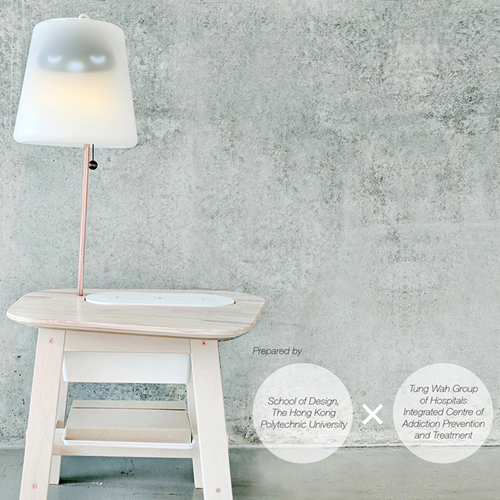What are the lifestyle trends that drive Asian economies and design? Asian Lifestyle Design Lab provides research service to and generates critical knowledge for designers and industries creating innovative, sustainable products and services for the Asian lifestyle. It also engages in fundamental and historical research, develops appropriate methodologies for fieldwork and analysis, and seeks collaborations with industrial and academic partners.
The Lab undertakes both broad and focused people-centric and user-centred research that explores those trends that have relevance to design-driven businesses serving Asian contexts, and it investigates the social, cultural, historical and environmental drivers of lifestyle change. It works in collaboration with several industrial and academic partners. The lab conducts ethnographic studies of everyday experience in urban China. Its current emphases are middle-class consumption, sustainable lifestyle, sustainable micro-production, related design research tools, and Chinese traditions of design thinking/ making.
The lab is also involved with the establishment of supportive networks such as LSDER-China.
Location: V713, 7/F, JCIT
A Multidisciplinary Initiative of Intervening Mobile Addiction via Family-focused and Gamification-enhanced Design
The research attempts to examine the multidisciplinary approach about incorporating interactive prototype and gamification with tangible experience (design discipline) and family functioning (social sciences discipline) to address the emerging global societal issue - mobile addiction in Hong Kong and overseas (Shek and Yu, 2016; Beranuy, Oberst, Carbonell and Chamarro, 2009) which causes negative impact to a family relationship (Takao, Takahashi & Kitamura, 2009; as cited in Chóliz, 2012) during 2016-2018. The project also demonstrates a cross-disciplinary platform whereby innovative methods are explored for the advancement of social work’s practice. The team members include Dr. Kenny Chow (Interaction Design Lab), Mr. Benny Leong and Dr. Brian Lee (Design Led) (Asian Lifestyle Design Lab) from School of Design, The Hong Kong Polytechnic University, and Dr. Elda Chan (mental health and addiction counsellor of Integrated Centre on Addiction Prevention and Treatment (ICAPT) of Tung Wah Group Of Hospitals) who provides ‘family-based’ counselling service. The proposed family-focused intervention system (an interactive lamp with wireless mobile charging platform, a series of game design, game log, self-guided probe, home visit and interviews) is based on family functioning (Dai and Wang, 2015; Epstein, Bishop and Levin, 1978; Shek, 2002; Smilkstein, 1984) and gamification theory (Deterding et al., 2011; Caillois, 2001) to enhance intimate parent-adolescent interactivity and mitigate adolescents’ excessive mobile use through specifically designed tangible games (activated by charging /put down the mobile).
The result was presented at two conferences (one with best presentation award), in the International Journal of Mental Health and Addiction, and exhibited at three local and international design exhibitions. The system received one product design award and one social service innovation award. The project team received additional funding (around HK$800,000) to further extend the study in which ninety families will be invited to further test the modified prototype during the end of 2018 to end of 2020.
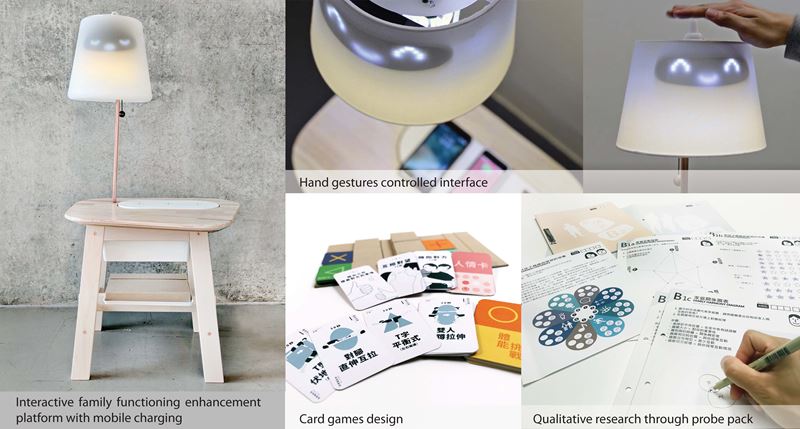
Keywords
Mobile phone overuse, Research through design, Family functioning, gamification enhanced intervention, Parents and adolescent relationship.
Project Introduction & Process
Can collective play enhance the cohesiveness of parent and adolescent relationships associated with excessive mobile phone use?
Based on the family functioning and gamification theory, this project is the first of its kind in Hong Kong that design academia collaborates with addiction counselling professions in exploring a family-focused intervention strategy (alternative practice to one of the current clinical practices) to verify the assumption that collective play activities can impact positively on parent and adolescent relationships, in return enhancing the psychosocial role of the family in mitigating the likelihood of addiction development of adolescents. With data collected and evaluated with various families, initial results apparently assured the benefits of this gamification enhanced intervention in a family context.
A play-platform (also an interactive lamp) is designed to enhance parent-adolescent interactivity at home. We identified positive benefits that physical collective-play not only stimulated emotional connectivity between parents and adolescents but also encouraged them to relive joyful memories of family activities before the mobile overuse problem had arisen. The first phase of the project was commenced in Feb 2016 and the second phase will end in 2019.
The prototype
The play-platform contains four major parts:
(i) the ‘table’, which assembled mainly by ‘ready-made’ components, such as a mobiles charger, a wooden framework, a plastic casing from IKEA, and a vibration activated timer;
(ii) the ‘lamp’, which integrates a bulb, LED display, motion sensor and Bluetooth module into a 3D printed housing to provide random game play instruction;
(iii) the game-card book where six stacks of competitive games (for physical-competence and intellectual challenges) are kept to be randomly suggested; and lastly
(iv) the gaming-record book and the lamp’s operation manual.
The operation
Family members are encouraged to rest their phones on the play-platform for charging. The lamp will be awoken by the first mobile to land on its charger. When all members’ phones are placed on the charger, the lamp brightened further, showing a smiling expression, and invited the family to play. When a hand waved over the lamp’s sensor, the lamp will suggest games randomly via its LED display. Players can then open the gamebook and draw a card randomly from within the stack suggested by the lamp. Various competitive games with specific time constraints are available.
Outputs
- LEONG Benny, LEE Brian, CHOW Kenny. (2018). Collective Play Versus Excessive Use: an Insight into Family-Focused Design Intervention for Mobile Phone Overuse. International Journal of Mental Health and Addiction, 1-16. (DOI: https://doi.org/10.1007/s11469-018-9966-9)
- LEONG Benny, LEE Brian, CHOW Kenny. (2017). A Multidisciplinary Initiative of Intervening Mobile Addiction via Family-focused and Gamification-enhanced Design, Asia - Design Engineering Workshop (A-DEWS), Seoul National University, Dec 11-12, 2017 (best presentation award)
- CHOW Kenny, LEONG Benny, LEE Brian. (2017). Designing intervention with technology for healthy mobile use - Personal and home approach. The First Asia Pacific Conference of Addiction Professionals (APCAP), HK, May 18-19, 2017
Media Coverages
理大團隊設計獲國際獎 互動燈助放下手機敘天倫 (Ming Pao Daily, 27 September 2018)
理大研發「羊燈」 助戒手機癮 (Sing Tao Daily, 27 September 2018)
Award
Lamb lamp is Bronze Design Award winner in 2017 - 2018 Lighting Products and Lighting Projects Design Award Category.
Collaborator
Tung Wah Group of Hospitals Integrated Centre on Addiction Prevention and Treatment (ICAPT), which was funded by The Hong Kong Jockey Club Charities Trust and launched in October 2012, aims to provide professional treatment services for multiple expressions of addictions and comorbid mental health disorders to the general public. To optimize the treatment outcomes, ICAPT has recruited a multi-disciplinary team consisting of psychiatrists, social workers, a clinical psychologist and a psychiatric nurse in order to provide a one-stop comprehensive assessment and treatment program including hotline counseling, individual and family counseling, health assessment and psychological and psychiatric assessment and treatment.

Team Members
Creative Director: Benny Leong
Design Director: Brian Lee
Interaction Design Consultant: Kenny Chow
ICAPT Counsellor: Elda Chan
Product Designer: Ada Chan
Engineer: John Mak
Production Consultant: Industrial Centre, The Hong Kong Polytechnic University
In search of placemaking strategies adopted in the public art project "City Dress Up"
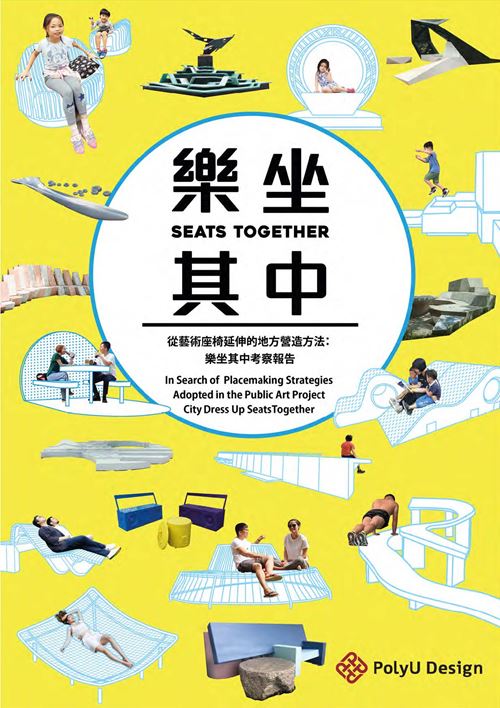
In 2016, the celebration of the 20th anniversary of the establishment of the Government of the Hong Kong Special Administrative Region (HKSAR) gave forth the largest scale public art project to foster the global outlook of Hong Kong through the nomination of five guest curators and twenty famous Hong Kong design teams to explore alternative park furniture solutions at different districts of Hong Kong. The project is called “City Dress Up: Seats.Together” (Seats.Together). It commenced in 2016 and twenty sets of creative public furniture were installed in July 2017 till July 2020 or onwards.
The project teams demonstrated diversified public art and design strategies. The works received tremendous success from various perspectives, including local and international awards. Meanwhile, the twenty designs bring in various “place-making” strategies which not only extends the definition of park seating furniture but also supports the development of creative citizenship through facilitating different users or community stakeholders to use the park furniture (or the public space) creatively while having ownership and self-actualization, etc
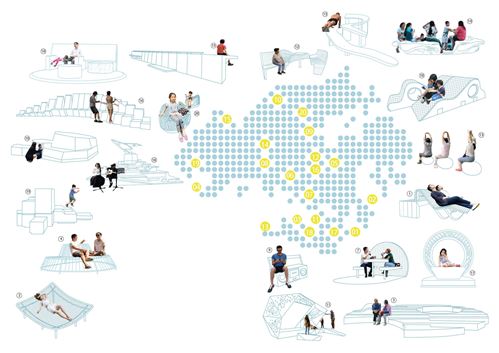
In terms of the scale of stakeholder’s participation, approaches, and contexts, this project is a collective and unique community experiment in which meaningful stories and useful knowledge are produced. For instance, different design approaches, community engagement methods and implementation strategies adopted by the individual project team are valuable assets that can inform future practice. A comprehensive study for reviewing the processes and the measurement of the impact of the design will be carried out through stakeholder interview, site observations, and user’s creative input. Content analysis is applied to conduct the comparative study of the data and concepts collected from the twenty parks. The result will shed light on the park furniture design guideline for the improvement of creative practices and project management. The result benefits both Hong Kong and international audiences who are interested in community art and design methods in the high population urban context.
“Seats.Together” offers alternative engagement and design strategies to the enhancement of quality of life of local communities through the park projects. This research project aims to identify the evidence from the learning experience and feedback of the stakeholders with the hypothesis that a creative and appropriate park furniture design can bring positive value changes in a community.
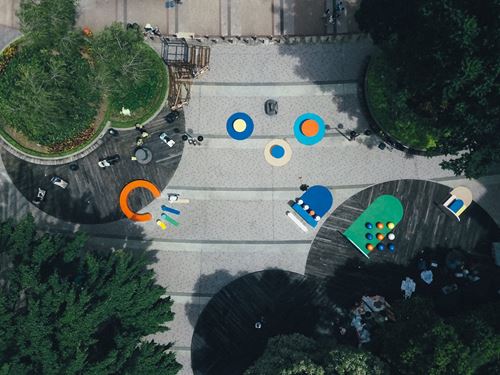
Collaborative Parties
Jockey Club Design Institute of Social Innovation PolyU, Art Promotion Office (APO) and Leisure and Cultural Services Department (LCSD) of HKSAR
Team Members from Asian Lifestyle Research Lab
Principal Investigator: Brian Lee
Research Associates: Ada Chan, Ire Tsui
Student Design Team: Destiny Chan, Susan Choi, Jenna Hung, Jessica Luk, Chan Lok Tung
Research Interns: Destiny Chan, Chan Lok Tung, Susan Choi, Smiley Chow, Jenna Hung, Jessica Luk, Derek Ng, Angel Tsang
Editor and Translators: Jessie Ng, Terry Soong
Leong, B.D., & Lee, Y.H., [2016]. "‘Sustainable Make, Act, Do’: Promoting Sustainable Lifestyle via SMAD". In Daichi Iwase (Ed), DESIS Lab Network (pp.21-23). Tokyo: Tokyo Zokei University Publishing.
Leong, B.D., & Lee, Y.H., [2014]. "Learning the Unlearned: Product Design for Sustainability". In ‘Product-Service System Design for Sustainability’ edited by Vezzoli, C., Kohtala, C., Srinivasan, A., Xin, L., Fusakul, M., Sateesh, D. and Diehl, J.C., UK: Greenleaf Publishing.
Leong, B.D., and Lee, Y.H., [2011] "Smarter All: Design and Design Research at the People Centric Era for China", Asian Design Journal, 6(1),12-43.
Leong, B. D., Lee, B. Y. H., & Chow, K. K. N. (2018). Collective Play Versus Excessive Use: an Insight into Family-Focused Design Intervention for Mobile Phone Overuse. International Journal of Mental Health and Addiction, 1-16. (DOI: https://doi.org/10.1007/s11469-018-9966-9)
Leong Benny, Lee Brian, Chow Kenny. (2017). A Multidisciplinary Initiative of Intervening Mobile Addiction via Family-focused and Gamification-enhanced Design, Asia - Design Engineering Workshop (A-DEWS), Seoul National University, Dec 11-12, 2017 (best presentation award)
Chow Kenny, Leong Benny, Lee Brian. (2017). Designing intervention with technology for healthy mobile use - Personal and home approach. The First Asia Pacific Conference of Addiction Professionals (APCAP), HK, May 18-19, 2017
Leader
Deputy Lab Leader
Member(s)



